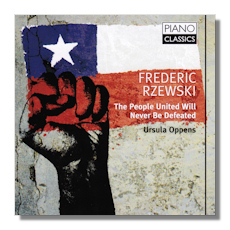
The Internet's Premier Classical Music Source
Related Links
- Rzewski Reviews
- Latest Reviews
- More Reviews
-
By Composer
-
Collections
DVD & Blu-ray
Books
Concert Reviews
Articles/Interviews
Software
Audio
Search Amazon
Recommended Links
Site News
 CD Review
CD Review
Frederic Rzewski

The People United Will Never Be Defeated
Ursula Oppens, piano
Piano Classics PCL0019
This excellent CD from the relatively new Piano Classics label is almost as much a celebration of the doyen of contemporary music pianists, Ursula Oppens, as it is of the brilliant and trenchant music of the modern American composer Frederic Rzewski (born 1938). Although Rzewski's compositional style is not strictly avant-garde, it's completely in accord with Oppens' sensibilities. This makes a pleasing recording – the only one in the current catalog; and one which can be recommended.
Rzewski's piece consists of 36 variations on the theme, El pueblo unido jamás será vencido, ("The people united will never be defeated"), which originated in the Nueva Cancion Chilena (New Chilean Song) movement. Although it's plebeian in sentiment and intent, the music of the song was actually composed by Sergio Ortega to text written by Chilean folk group Quilapayún. The opening track, the theme, of Rzewski's variations is 36 bars long. The repetition of motifs, the harmonies, rhythms and modulations of the theme sustained over those three dozen more could be trying… it's a relatively simple theme. But they're not. Far from it. There is surprise, true variety and a range of moods and approaches to the basic idea.
The song, of course, celebrates the optimism of those oppressed in Chile by earlier regimes when Allende came to power in 1969. Rzewski's work is a conscious tribute to that sense of new hope. This work of his is a positive and concrete public gesture of solidarity with those who continued the struggle against all odds. Written in 1975 (and dedicated to Oppens) it came after the Fascist coup two years earlier that toppled Allende and so stands unequivocally with the song's status as emblematic of its status as an unofficial anthem of the Chilean resistance and the irrepressibility for which that movement stood, and in some ways still has to stand.
In style and sentiment The People United Will Never Be Defeated represents a parallel change in direction with that made by composers like Cornelius Cardew in the 1970s away from a more adventurous and avant-garde idiom to music designed to be more accessible. Influences of jazz and the popular songs of the Italian left (Rzewski had lived in Rome on and off for more than ten years) also contributed to this shift.
But there's nothing trite or self-conscious about the music on this CD. It's as much or more music as it is political and social "message". Nor is that musical strength insipid. There are outer registers, unusual sonorities, extended repeated notes, hints at improvisatory techniques, as well as Cagean intervention by the pianist… whistling, vocalizing, slamming the piano lid and so on. Oppens makes this her own in such a way as to commend to listeners who come to the music with a variety of expectations the notion that such dedication and security in technique and musical purpose themselves serve the cause of the oppressed by illustrating it as complex, worthwhile, of high quality and as finely nuanced and as full of depth and life as of force.
For instance, The People United Will Never Be Defeated, although a set of variations, is shot through with a structure that bespeaks logic, focus, rationale and even discipline. If social justice is to be wrested from the oppressor, all work for it had better be well organized. Yet Oppens' playing is never dry or automatic, never dull or mechanical. She infuses as much life into Rzewski's writing as surely he intended. By the same token, the rigor of the music is vital to its enjoyment and understanding (it's grouped into six sections of six, where the sixth of each set is itself in six parts "summarizing" the development of the previous five and a final transitional piece). Although it might be fanciful to see a gesture to five fingers then a fist, the extra-musical significance is there. But never overplayed or treated coyly by Oppens. Nor does she draw undue attention to the bar counts that also underpin the music.
Instead, her playing concentrates on the resulting intensity with which Rzewski infuses The People United Will Never Be Defeated. Or rather, which is soon seen to emerge very naturally from the very essence of the music. Her balance of spontaneity and unforced attention to detail is exemplary; it's what makes this set as good as it is.
The acoustic is close and appropriate. Originally recorded in 1978 and released on Vanguard, it's still fresh and immediate. The booklet is informative and contains a listing of the variations, over half of them having such descriptions as "Relentless, uncompromising" and "L.H. strictly; R.H. freely, roughly in space". Piano music that advances a good external cause isn't plentiful. Here's an example, extremely imaginatively-played, that is much more full of interest than it at first may seem; and well worth investigating.
Copyright © 2012, Mark Sealey.





















